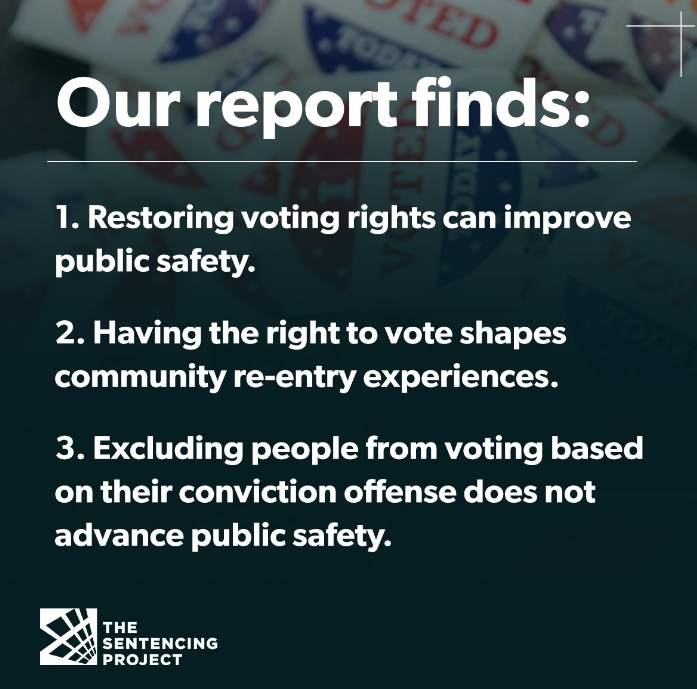Restoring Voting Rights Increases Public Safety
The Sentencing Project reports indicates package of pro-social activity improves integration efforts.

A new report from The Sentencing Project details the beneficial impacts of restoring voting rights for all Americans who have been convicted of a felony, whether they are inside or outside of prison.
Over 4.6 million Americans cannot vote due to a felony conviction, which is nearly four times as many people since the onset of mass incarceration in the 1970's. The exclusion of justice-impacted individuals from voting is a direct ramification of the U.S. prison population surge over that time. The United States is an international outlier both in its heavy reliance on the criminal legal system and its disenfranchisement of people in prisons and jails, those completing their sentences in the community, and millions of others who are no longer under correctional supervision.
The majority of Americans who cannot vote due to a felony conviction, nearly three out of four, are no longer incarcerated and living in our communities completing felony probation or parole. These individuals are working and paying taxes. They are caregivers. They raise children. Yet, because they cannot vote, they do not have a voice in everyday laws and policies that affect their lives. Excluding people from participating in democratic life is an additional punishment. Civic engagement, including the right to vote, plays an important role in successful reintegration.
Felony disenfranchisement is particularly devastating for people of color, who are disproportionately represented in the criminal legal system. Over two million voting-eligible Black and Latin Americans are blocked from participating in this fundamental right. In 2022, one in 19 voting-eligible Black Americans was banned from the ballot box. One in 10 Black Americans was banned from voting in Alabama, Arizona, Florida, Kentucky, Mississippi, South Dakota, Tennessee, and Virginia. It is estimated at least 506,000 Latin Americans are disenfranchised.
Felony disenfranchisement perpetuates the racist intent behind its historical creation and acts as a contemporary structural barrier to advancing racial justice. Despite scientific evidence and public support for re-enfranchisement, having the right to vote is determined by geography in this country instead of our values as Americans due to variations in disenfranchisement laws and policies.
The study makes three significant conclusions when it comes to restoring voting rights for justice-impacted people:
- Restoring voting rights improves public safety. Studies show associations between reduced recidivism and voting among people with a criminal history.
- Restoring voting rights improves community reintegration efforts. Studies indicate the right to vote was a fundamental component of developing a prosocial identity, whereas being restricted from voting reinforced an outsider status.
- Conviction-based voting rights exclusions do not advance public safety. Research done in Florida, a state where restoring voting rights is nearly impossible, indicates banning people from voting makes them feel ostracized, is psychologically harmful, and has a negative impact on perceptions of being able to live crime-free.
You can read and download the report "Increasing Public Safety by Restoring Voting Rights" (opens in PDF) from The Sentencing Project.










